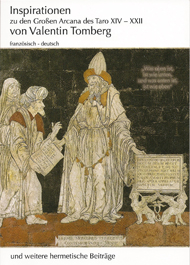 Die deutsche Version dieser Homepage finden Sie unter fhab.de Die deutsche Version dieser Homepage finden Sie unter fhab.de |
 |
|
Valentin Tomberg
During this time talks are held with Emil Bock, then head (“Erzoberlenker”) of the Christian Community, concerning a possible cooperation within this movement. However, also here no space is found for Tombergs contribution.
In 1948 Tomberg, with his wife Maria and his son Alex, moves to Caversham, near Reading, in England. Here Tomberg is given a new opportunity to earn a livelihood through his employment at the BBC. He is given charge of the recordings of the broadcasts of the Soviet broadcasting service. In the evenings he spends his time studying at the British library in Reading.
Tomberg spiritually receives the assignment to engage himself within the Catholic Church and applies himself to this task. It shall be mentioned here that evidence has never been found to prove that he in actual fact formally entered this Church. He placed himself within the Catholic stream as a free spirit and offered this Church an esoteric foundation shaped of its very own essence in his work “Meditations on the Tarot”. This work has its source in the pre-Christian Christianity of ancient Egypt, which was inaugurated and inspired by the great Hermes Trismegistos. Tomberg himself described his contribution as adding “the dimension of depth” to the modern Catholic Church. He chooses to write the work on the Tarot in French because the hermetic tradition had survived the longest within the stream of this language. The book appeared anonymously in a German translation by Mrs. von Hippel in Anton Hain Verlag, Meisenheim am Glan, 1972. Tomberg indicates that this work has its source in realms beyond that of human reason as he so to speak from “beyond the grave” reaches over to and addresses “the unknown friend” (the reader). Later a French version appears in Aubier, Paris, unfortunately, however, in a modified form. In the mean time many versions have appeared.
In his later years Tomberg applies himself to the writing of essays which later appear in a fashion strongly modified by Prof. Martin Kriele in Herder Verlag under the title “Lazarus komm heraus” (“Lazarus, come forth [14]”) published by Robert Spaemann. Also in this work Tomberg connects spiritual teachings with the contents of the Christian faith, in this way again offering the Church a means of self-knowledge and a way towards an inner deepening of its teachings. The last lines of the essay “Thy Kingdom Come” from this book contain words that sound like a legacy to the future:
… “These historians (of the future) will for instance write about the “condition of the desert” in which mankind is placed in front of the three temptations; that of power (the power over “all the kingdoms of the world and their splendour”), that of materialism (“turning stones into bread”), and the experimental method (the “fall from the pinnacle of the temple”). And they will recognize and describe great ideological and socio-political movements and streams as well as epoch-making discoveries and phases of science as nothing but aspects of these three temptations; indeed they will even describe these as essential experiences on the path toward purification.
Then they will pursue the insights mankind has won from overcoming these temptations and describe the manifold forms of enlightenment that arises from the winning of these insights. They will do this in order to present the path towards enlightenment of mankind.
And lastly these chroniclers of human spiritual history will tell of single human beings and communities of human beings who have led the way towards consummation; i.e. whose abilities and capacities gave witness to the fact that the kingdom of humankind is able to merge and unite with the kingdom of god.”
----------------------------------------
[14] Published in English by Lindisfarne Books, 2007, 2nd Edition, in a translation by Robert Powell
- « first
- ‹ previous
- of 3
